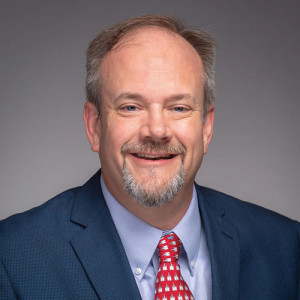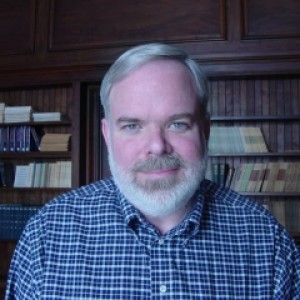Episodes

Thursday Mar 28, 2019
Bonus Episode - Patricia Bellm: Compartmentalization vs. integration
Thursday Mar 28, 2019
Thursday Mar 28, 2019
Compartmentalization by students at Notre Dame
Bill: ethics as a checklist
The Science & Religion Initiative (see Baglow & Martin interview)
The need to get the same message in the biology class and in theology class
The change in the teachers after a few days in the workshop: divisions fade out
It's a challenge having an "athletics" teacher in the program (phys ed)...
Yet there are things: doping and respect of the body
Patricia believes "you become what you eat" applies to violent video games as well
Feed yourself and your children good things instead

Monday Mar 25, 2019
Monday Mar 25, 2019
0:30 - McGrath Institute for Church Life: Science & Religion Initiative outreach to high school teachers to integrate science & faith
2:00 - Gulf Coast Faith Formation Conference (a good time to be away from Notre Dame)
3:00 - Summer seminars: Foundations Notre Dame, Foundations New Orleans, Capstone
4:00 - Foundations ND: lecture based, top scholars in specific disciplines, with workshops
6:00 - Foundations NO: experimental work and discussions
7:00 - Dialogue between science & theology teachers about their own specialties
8:00 - Capstone: topic-based theme & lecturers; special track for administrators; teaching practices
11:00 - Templeton Foundation study showing schools already trying to do this on their own
12:00 - The need to do this well and not engage in pseudoscience or gloss over tough questions
14:00 - ICL team making "housecalls" to individual schools
14:30 - Baglow textbook on science & faith
18:00 - Vast multiplication of interest from schools just since 2011
19:00 - Real motivations for believing faith is inconsistent with science: the need for hope [and, not made explicit, the appropriateness of hope]
20:00 - "I thought I was the only one"
21:00 - The historical and emotional impulse: rebellion against Christian hypocrisy
22:30 - Baglow makes the Fulton Sheen point: "I also hope THAT God doesn't exist!"
23:00 - The questions he wishes people would ask about God, meaning, science, etc.
24:00 - "What do you mean by 'God creates everything'"
25:00 - The nature of the discourse we encourage
26:30 - "I don't know"
27:00 - "When did science and religion enter into conflict?" - because they have not always been
28:20 - The true role of the university in integrating human wisdom
30:30 - Newman on evolution in the context of Development of Christian Doctrine

Friday Mar 22, 2019
CNAG: Money
Friday Mar 22, 2019
Friday Mar 22, 2019
Money is a fascinating topic to take up in this connection because doing so illuminates some serious, jagged fractures within both of our contemporary political camps of “conservative” and “progressive” thought, and indeed, within our own minds.
“Whatever may be said in praise of poverty, the fact remains that it is not possible to live a really complete or successful life unless one is rich.” – Wallace Wattles
“Hello? How gross is that [quote]?! It offended me to my hippie core, until I understood what it was really saying and that, erm, you kind of can’t —not if you want to fully express yourself, anyway… you have to let a lot go because it will absolutely go up your nose if you’re still working on your issues around it being OK to make money.” – Jen Sincero, talking about that quote and the book containing it
“Money is not the root of all evil!” – Cathy Heller (if not an absolute quote, extremely close)
“Those who want to get rich fall into temptation and a trap and into many foolish and harmful desires that plunge people into ruin and destruction. For the love of money is a root of all kinds of evil. Some people, eager for money, have wandered from the faith and pierced themselves with many griefs. But you, man of God, flee from all this, and pursue righteousness, godliness, faith, love, endurance and gentleness.” – Paul of Tarsus, 1 Tm 6:9-11
“Money, it’s a hit
Don’t give me that do-goody-good bullshit” – Pink Floyd
Money. Wealth. It unites people as diverse in their political thinking and way of life as Oprah, the Koch brothers, George Soros, El Chapo, Vlad Putin… and hatred of it, renunciation of it, or contempt for those who have it (important distinctions, admittedly) unites Francis of Assisi, Karl Marx, Mother Theresa, and as Jen Sincero notes, your general hippie, hipster, and mousy academic type.
People want money. They want various of the things you can exchange money to obtain (food, housing, pretty objects, fast objects, sexual favors…). Unsurprisingly, given that, they want money for the mere fact of having money, or rather, the emotions related to security and power that possessing money provides.
As far as practical advice goes, the right attitude toward money and wealth seems to me to require a lot of work on that nagging issue I identified a while back: we’re either bored with the golden mean, or it’s too complicated for us to think about two things at once.
Of course, to get by in modern society and do much of anything to help people, we need money. On the other hand, we all experience the temptation to spend money irresponsibly. We spend money on things that will not help others even in the indirect (and completely real) sense that we need to help ourselves in order to help others. We spend money on things that are actually destructive: alcohol, strip clubs, access to crappy TV shows that we know are eating up our lives and giving nothing back, Lexus SUVs, a fifth set of power tools. We exalt this money thing to the position of Higher Power and guiding light for our lives, piling up ever more of that security and power far past any point of diminishing returns. We spend time thinking about and managing this money to the exclusion of living a real human life.
Christianity warns us about all of that early and often. What we then seem to have done, here in the West, is bend part of ourselves back too far in the other direction and try to carry on with an unrealistic set of expectations about not being one of those bad rich people, yet wanting all the things that money can buy. If we want to be Mother Theresa, yet also drive Jen Sincero’s Audi, then yeah, we’re going to come into conflict with ourselves.
At this point, of course, the net widens…
CNAG is the Catholic-New Age Glossary… not backed by Webster’s or any other authority. These reflections are written by Paul, and they here on That’s So Second Millennium because they are an attempt to find the points ofharmony between different strands of psychology and spirituality as they are being explored and lived out in Western culture today.

Thursday Mar 21, 2019
Bonus Episode - Patricia Bellm: Bible interpretation
Thursday Mar 21, 2019
Thursday Mar 21, 2019
The Bible as an instrument of getting to tell people what to do
Flood geology and cramming one's ideas into a "literal" reading
Adam and the Genome

Wednesday Mar 20, 2019
Post Christian: Why Bother?
Wednesday Mar 20, 2019
Wednesday Mar 20, 2019
This is in part a follow-on to the last CNAG entry on the term “deserve.” There is definitely a tension between the universalist strain within the New Testament that has cropped up from time to time within the history of Christianity, and the opposite, or at least complementary strain that stresses the importance of spreading the message of Jesus Christ and convincing others to explicitly take up his teachings and his way of life.
The problem with the universalist view is, of course, one of practical psychology. If you can be all-or-nothing “saved” without needing to “accept Jesus Christ as your personal Lord and Savior,” or for that matter go through the instructional and ritual process of the catechumenate and be baptized, then why does it matter whether anybody spreads the gospel or not?
Obviously, I gave the game away with the term “all-or-nothing.” It may very well be, and I believe it is most likely, that many human beings with little or no explicit knowledge and no explicit allegiance to Jesus of Nazareth in this mortal lifetime nevertheless find themselves in His comforting embrace for eternity, because even outside that explicit structure, they ultimately cast in their lot with the good that God made known to them and repented of the evil. Yet that hardly makes it not worthwhile to do what we can to make Jesus known and revered.
First of all, if the reality is that every human being’s destiny is bound up with this man’s life and death, why would we not want to spread the word? The argument, “it’s true and I would want to know” surely suffices on its own.
Second, do you really think that there is no lasting value to doing more good in this life? Is it really the case that the best life is to enjoy as much as possible of this world’s pleasures, do a minimal amount of good for others, and just slide under the wire to make some minimal criterion for salvation (a deathbed conversion, etc.)? That is the stuff of social conformity.
I don’t know whether I can actually change anyone else’s fate by telling them about Jesus, the things I believe He has done for me, or the way Christianity makes the universe make more sense to me. I don’t know whether any of the help I have tried to give by visiting my lonely old greataunt or counseling poor pregnant women or anything else could have done that either. I don’t know if Mother Theresa, in a long life of prayer and caring for the needy, ever flipped anyone’s destiny from hell to heaven; nor do I know that any tyrant or abuser ever did the opposite.
Maybe the good and the evil that we do provide points of departure for other people to make their choices for or against goodness and God, but I have a hard time seeing how God would judge them for anything I did or failed to do.
Yet surely it is still worth while to spread the truth, and if the gospel is the truth, it is the best truth we can spread. I want to do as much good as I can. I don’t want to be mediocre, in time or in eternity.
The Post Christian meditations, written by Paul, address the larger question, “Why do people believe science and the Catholic, Christian faith are mutually contradictory?” They consider the background reasons why people in the modern West desire to punish the faith of their ancestors and deny it credibility, apart from any cogent reasons to reject its actual dogmas and teachings.

Monday Mar 18, 2019
Monday Mar 18, 2019
What do we want to do in this podcast?
Goals for the year
Values of experience, e.g. Mexico: solar ovens from recycled materials
Credit consulting, etc., for exploited women in Mexico
The little estate in Mexico
Back to credit cards & exploitation of ignorance
Responsibility of those to whom much is given
Bringing it around to science
Career and sacrifice and little deaths
Chris, the handicapped man at the ND Center for Social Justice
The ethics of "fixing" or preventing Chris from being the way he is
The lack of philosophic background and the intellectual amnesia of contemporary science
Philosophy of science and the disappointment of 20th century physics, but the culture goes on unaware
Science, fundamentally cannot replace faith
...this is where Patricia makes that claim that science is about control
Ethics of changing human beings, other elements of creation
Bill poses the relativism question again
Patricia responds that "you can control science"
Everyone confronts the same Reality, and we cannot control it, but we prefer the illusion that we can

Saturday Mar 16, 2019
Bonus Episode - Patricia Bellm: Miguel from Mexico
Saturday Mar 16, 2019
Saturday Mar 16, 2019
The blind man who could see more than his neighbors... asking Patricia about German reunification
The industries that used up his sight

Monday Mar 11, 2019
Episode 050 - Craig Lent: decoherence, entropy, and faith
Monday Mar 11, 2019
Monday Mar 11, 2019
0:00 - Three issues: entropy, decoherence, Schrodinger vs. Dirac equations
2:30 - Schrodinger uses a non-relativistic Hamiltonian, with a p^2/2m kinetic energy
3:00 - Dirac equation absorbs special relativity by shifting from scalar to spinor field
4:00 - Quantum field theory as a further extension, accommodating fields that include many particles
5:00 - Field Lagrangian and all the particles and interactions in the Standard Model
6:00 - Even "everyday" gravity is in some sense accommodatable in the theory, just not extreme gravity capable of "separating out the vacuum"
8:00 - Decoherence, not to be confused with the measurement problem
9:00 - Decoherence arising from the interaction of a simple system with other systems
10:00 - Reduced density matrix begins to look classical
11:00 - Zurek and the work on decoherence: states that are "chosen" to survive interaction with the environment
11:30 - Measurement problem not solved by this work
12:30 - Entropy: the proposal that entropy is most fundamentally lack of information
progress from the special case of thermodynamic entropy, to statistical mechanics,
to von Neumann's quantum definition, to Shannon's information theory
21:00 - Craig's career: why is an engineer so interested in the fundamentals of physics?
24:00 - Journey of faith
30:30 - People of Praise in Indianapolis
31:20 - Final thoughts

Monday Mar 04, 2019
Episode 049 - Craig Lent: physics and humanity
Monday Mar 04, 2019
Monday Mar 04, 2019
0:00 - Introduction
1:00 - The power of physicalism/reductionism: a tremendously powerful method
2:00 - Course on physicalism and Catholicism; Sean Carroll's least hysterical "poetic naturalism"
3:00 - The lack of evidence for "emergence" in the sense of "downward causation"
3:30 - Soft and hard emergence
10:15 - Materialism vs. physicalism and reductionism: philosophical materialism
13:00 - Are human beings exhausted by this account of reality?
14:00 - The break with the mechanical universe of 19th century physics underappreciated
15:00 - Laplace's demon
16:30 - Thermodynamics
17:30 - Future not contained in the present
19:00 - Einstein & hidden variables
20:00 - Bell inequality experiments
24:00 - Entanglement
26:00 - Human experience: both, as physical, but also as having choices
27:00 - Quantum physics on many body systems
28:00 - The hard problem of consciousness
29:00 - The explanatory gap
31:00 - The tendency to explain the brain as "just like" some recent piece of technology
33:00 - Complexity of neurons, the continuing relevance of physical laws amid the complexity
35:00 - Continuing relevance of quantum effects at the level of neurotransmitter molecules, etc.
36:00 - Quantum effects in weather and rock mechanics

Thursday Feb 28, 2019

